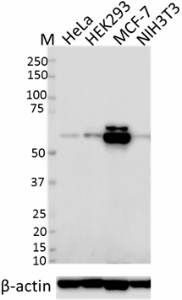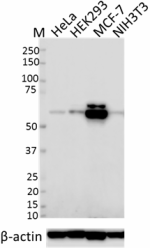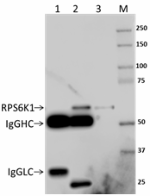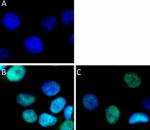- Clone
- W17145A (See other available formats)
- Regulatory Status
- RUO
- Other Names
- Ribosomal protein S6 kinase beta-1, S6K1, 70 kD ribosomal protein S6 kinase 1, P70S6K1, p70-S6K 1, Ribosomal protein S6 kinase I, Serine/threonine-protein kinase 14A (STK14A), p70 ribosomal S6 kinase alpha (p70 S6KA)
- Isotype
- Rat IgG2b, κ
- Ave. Rating
- Submit a Review
- Product Citations
- publications

-

Total cell lysates (15 µg protein) from HeLa, HEK293, MCF-7 and NIH3T3 cells were resolved by 4-12% Bis-Tris gel electrophoresis, transferred to nitrocellulose membrane, and probed with 1:2000 (0.25 µg/mL) diluted purified anti-RPS6KB1 antibody (clone W17145A) (upper). Proteins were visualized using 1:3000 diluted HRP goat anti-rat-IgG secondary antibody (Cat. No. 405405) and chemiluminescence detection. Direct-Blot™ HRP anti-β-actin Antibody (1:2000 diluted, clone 2F1-1) was used as a loading control (lower panel). Lane M is the MW ladder. -

Total cell lysates (400 µg protein) from HEK293 cells were incubated with 2.5 µg rat IgG2b isotype control (lane 1) or anti-RPS6KB1 antibody (lane 2) at 4°C for 3 hours, followed by incubating the Protein-G beads overnight. Immunoprecipitates and total protein (10% of input, lane 3) were eluted with SDS loading buffer and resolved by 4-12% Bis-Tris gel electrophoresis, transferred to nitrocellulose, and probed with 1:500 (1 µg/mL) diluted purified anti-RPS6K1 antibody (clone W17145A). Proteins were visualized using 1:3000 diluted HRP goat anti-rat IgG secondary antibody (Cat. No. 405405) and chemiluminescence detection. Lane M is the MW ladder. IgGHC: IgG heavy chain, IgGLC: IgG light chain. -

MCF-7 cells were fixed with 4% PFA for 15 minutes, permeabilized with 0.5% Triton X-100 for 3 minutes, and blocked with 5% FBS for 60 minutes. Then the cells were intracellularly stained with (A) 1: 250 (2 µg/ml) purified rat IgG2b Isotype Ctrl antibody or 1:250 (2 µg/ml, B) and 1:500 (1 µg/ml, C) anti-RPS6KB1 antibody (clone W17145A) overnight at 4 degree followed by Alexa Fluor® 488 (green) conjugated goat anti-rat IgG (Cat. No. 405418) for one hour at room temperature. Nuclei were counterstained with DAPI (blue). The images were captured with a 60X objective.
| Cat # | Size | Price | Quantity Check Availability | Save | ||
|---|---|---|---|---|---|---|
| 609901 | 25 µg | £70 | ||||
| 609902 | 100 µg | £174 | ||||
Ribosomal protein S6 kinase beta-1 (RPS6KB1), also known as p70S6K, is a serine/threonine kinase participating in the PI3K/mTOR signaling pathway. Upon activation, RPS6KB1 phosphorylates ribosomal protein S6, resulting in selective translation of the 5’-terminal oligopyrimidine tract mRNAs encoding ribosomal proteins and elongation factors. RPS6KB1 also regulates translation initiation and elongation by phosphorylating eukaryotic translation initiation factor 4B (eIF4B) and eukaryotic elongation factor 2 kinase (EEF2K). RPS6KB1 has been found to be crucial in cell growth, cell cycle progression, and cell survival. Inhibition of RPS6KB1 activity results in G1 arrest and delay of entering S phase. Phosphorylation of Bcl-2-associated death promoter (BAD) by RPS6KB1 rescues cells from apoptosis. Impaired regulation of RPS6KB1 has been linked to a variety of diseases, including cancer, diabetes, and obesity.
Product DetailsProduct Details
- Verified Reactivity
- Human, Mouse
- Antibody Type
- Monoclonal
- Host Species
- Rat
- Immunogen
- Human RPS6KB1 peptide (508-525 a.a.) conjugated to KLH
- Formulation
- Phosphate-buffered solution, pH 7.2, containing 0.09% sodium azide.
- Preparation
- The antibody was purified by affinity chromatography.
- Concentration
- 0.5 mg/ml
- Storage & Handling
- The antibody solution should be stored undiluted between 2°C and 8°C.
- Application
-
WB - Quality tested
ICC, IP - Verified - Recommended Usage
-
Each lot of this antibody is quality control tested by Western blotting. For Western blotting, the suggested use of this reagent is 0.125 - 1.0 µg per ml (1:500 - 1:4000 dilution). For immunocytochemistry, a concentration range of 1.0 - 2.0 μg/ml (1:500 - 1:1000 dilution) is recommended. For immunoprecipitation, the suggested use of this reagent is 2.5 µg for 400 µg total. It is recommended that the reagent be titrated for optimal performance for each application.
- Application Notes
-
As per the Human Protein Atlas RNA level dataset, HeLa and HEK293 cells are expected to have a low level of RPS6K1 expression.
This clone recognizes two isoforms (56 and 59kD) of RPS6K1 by WB analysis. - RRID
-
AB_2749938 (BioLegend Cat. No. 609901)
AB_2749938 (BioLegend Cat. No. 609902)
Antigen Details
- Structure
- 525 amino acids with a predicted molecular weight of 59 kD. Contains a serine/threonine kinase domain.
- Distribution
-
Nucleus. Mitochondrion.
- Function
- RPS6KB1 is a serine/threonine kinase mediating in the PI3K/mTOR signaing pathway. It participates in the regulation of cell growth, cell cycle progression, and cell survival.
- Interaction
- Interacts with PPP1R9A, RPTOR, IRS1, EIF3B, EIF3C, TRAF4, POLDIP3, and IER5.
- Biology Area
- Cell Biology, Signal Transduction
- Molecular Family
- Protein Kinases/Phosphatase
- Antigen References
-
- Chen B, et al. 2017. PLoS One. 12:e0182891.
- Cai C, et al. 2015. Clin Cancer Res. 21:4922.
- Bahrami-B F, et al. 2014. J Clin Pathol. 67:1019.
- Tao T, et al. 2014. Tumour Biol. 35:8543.
- Li PD, et al. 2012. Med Oncol. 29:3070.
- Gene ID
- 6198 View all products for this Gene ID
- UniProt
- View information about RPS6KB1 on UniProt.org
Related Pages & Pathways
Pages
Related FAQs
Other Formats
View All RPS6KB1 Reagents Request Custom Conjugation| Description | Clone | Applications |
|---|---|---|
| Purified anti-RPS6KB1 | W17145A | WB,ICC,IP |
Compare Data Across All Formats
This data display is provided for general comparisons between formats.
Your actual data may vary due to variations in samples, target cells, instruments and their settings, staining conditions, and other factors.
If you need assistance with selecting the best format contact our expert technical support team.
 Login / Register
Login / Register 










Follow Us